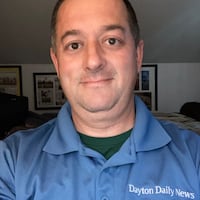Few events in the history of the arena compare to what took place Thursday night. UD held an event titled “The Spotlight, To Shine A Light On Mental Health” and delivered a message bigger than the basketball games, including a charity exhibition game between Dayton and Ohio State on Sunday, that will soon take over UD Arena from November through March.
The goal, Dayton Athletic Director Neil Sullivan said after the event, was to help at least one person struggling with mental health issues — and hopefully many more.
“We haven’t done this before, but we just wanted to lean in and listen to the experts,” Sullivan said, “and they said talking about it would be one of the things that could be helpful.”
The death of Jay Grant, the 20-year-old daughter of Dayton men’s basketball coach Anthony Grant, in 2022 led to this event 17 months later. Jay died by suicide, and Grant and his wife Chris released a statement after her death that they planned to “advocate for more comprehensive mental health care and to do all we can to increase awareness around these issues.”
In 2023, they have lived up to that promise. Grant spoke publicly about Jay for the first time in an interview for the Ohio Bureau of Workers’ Compensation Medical & Health Symposium in May. He and Chris told their story again this month to Dayton Daily News columnist Tom Archdeacon, in part, to raise awareness for The Spotlight.
Credit: David Jablonski
Credit: David Jablonski
Credit: David Jablonski
Credit: David Jablonski
Both Grants spoke on the floor of UD Arena on Thursday, facing a crowd of hundreds, including the entire UD men’s basketball team and many other UD athletes. That age group was the focus of the event, which strove to “drive awareness and education of mental health and wellness in adolescents and young adults.”
A mental health resource fair preceded the town hall portion of the evening. Tables on the concourse allowed a number of organizations, including the National Alliance on Mental Illness and the Hope Squad, of Fairmont High School, to spread their message. During the 2½-hour town hall event, the 988 Suicide and Crisis Lifeline scrolled across the videoboards along with other ads and phone numbers aiming to help those in distress.
Grant has been open about his earlier lack of knowledge of the resources available and what he has learned since the death of Jay.
“There were a lot of things we experienced over about an 18-month period as our daughter experienced her struggles that we didn’t ever imagine we would have to go through,” Grant said. Our thought is we realize we’re not the only ones. Because of what I do for a living, we have a platform, an opportunity to maybe have people listen differently because of what I do. I quickly realized as my daughter was going through her struggles that I needed help. We needed resources. We needed more information about where to go and what to do. Unfortunately, we weren’t able to get the help in time for our daughter. Our hopes is we can bring some purpose to the pain my family is going through right now.”
Chris Grant addressed the young people in the crowd by saying, “No battle is won alone. We want you to live and half a full life. I’d give anything for our daughter to be here with us today.”
The featured speakers were Mark and Kym Hilinski, who started the Hilinski’s Hope Foundation after their son Tyler, a quarterback at Washington State University, died by suicide in 2018. The Hilinskis now travel around the country giving speeches like the one they gave at UD Arena. They told the story of Tyler, who showed no signs of mental health problems.
The Hilinskis’ goal is to break the stigma of talking about mental health. That was the goal of the spotlight, as well.
Grant said at the end of the event he doesn’t know if he could have made a difference for his daughter, but knowing what he knows now, he knows “there’s more he would have tried to do.”
“I know it’s not an easy conversation,” Grant said. “But it’s definitely one we need to have. We need to find the courage to have it with our friends and our loved ones. It’s a difficult conversation. I get it.”
UD Arena has hosted many unique events over the years but probably nothing quite like this. pic.twitter.com/y3WFFrsKKN
— David Jablonski (@DavidPJablonski) October 19, 2023
Mark and Kym Hilinski delivered a powerful story about mental health at UD Arena, talking about the loss of their son Tyler. pic.twitter.com/99zsFYxUT0
— David Jablonski (@DavidPJablonski) October 19, 2023
About the Author


